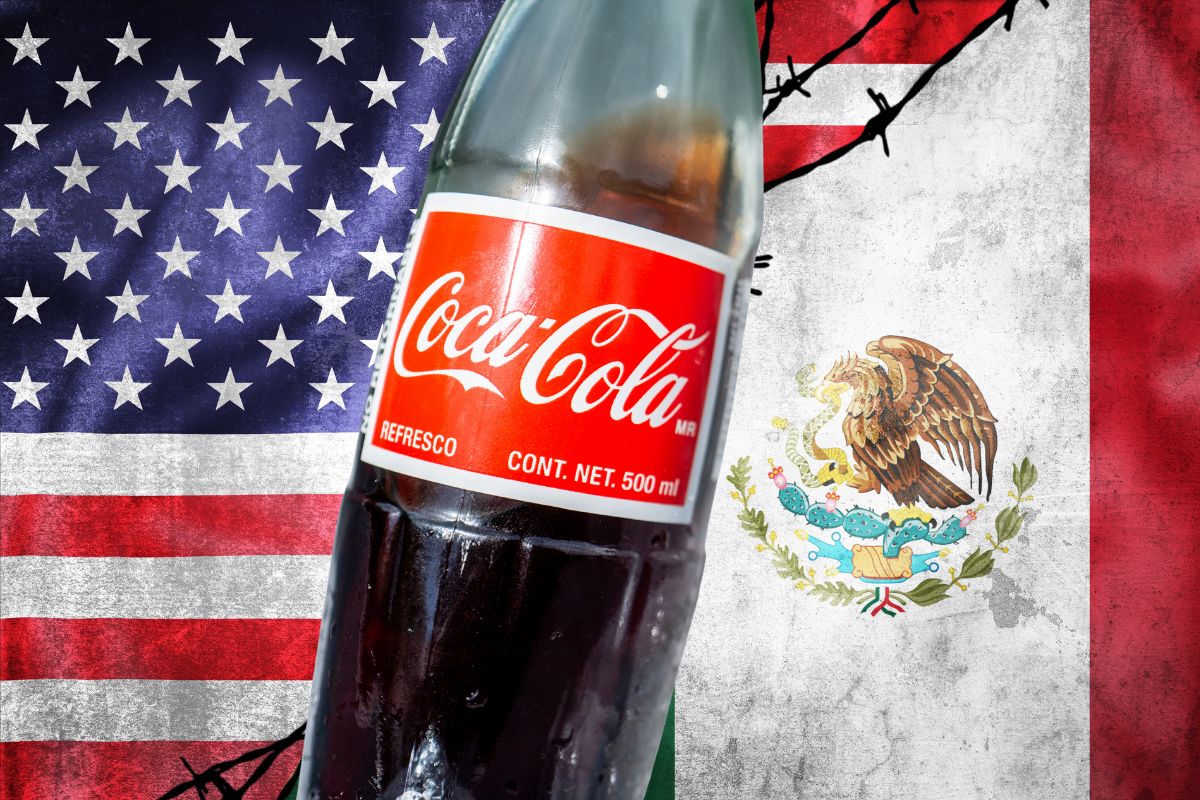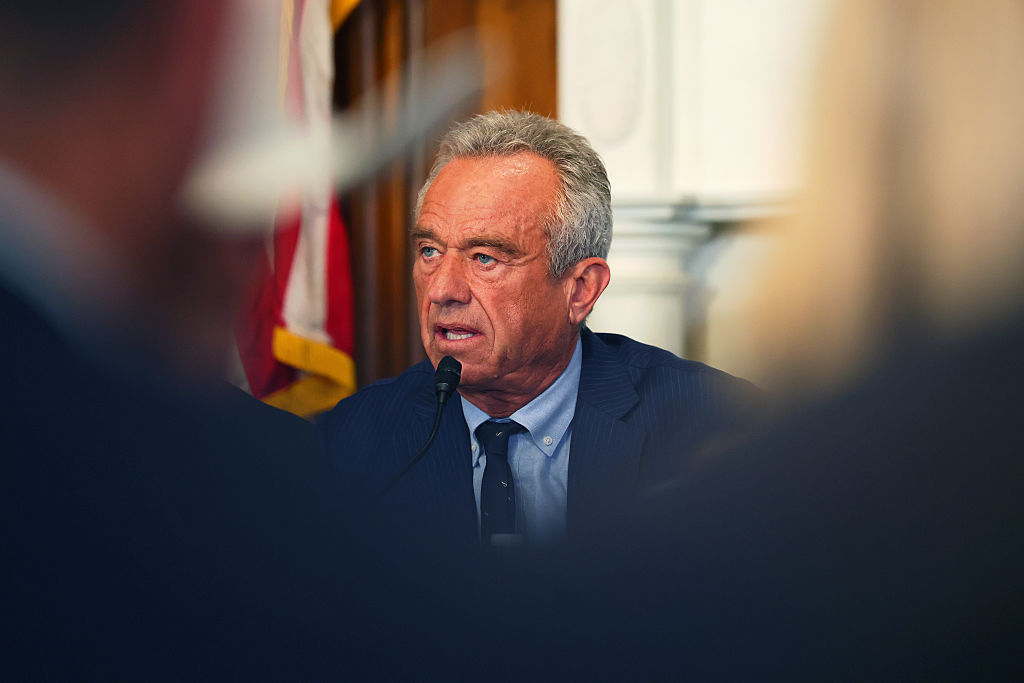Coca-Cola announced that it will begin distributing a version of its signature soft drink, made with cane sugar, in the U.S., sparking debate over health benefits and potential political influence. The move comes after President Donald Trump and Health and Human Services Secretary Robert F. Kennedy Jr. credited the decision to the “Make America Healthy Again” (MAHA) initiative.
What to Know:
- Coca-Cola will offer a cane sugar–sweetened version alongside its current formula, which contains high-fructose corn syrup.
- President Trump and Secretary Kennedy claim credit for the shift, linking it to their MAHA campaign.
- Health experts say cane sugar and corn syrup have nearly identical metabolic effects and pose similar health risks.
- Critics argue that the change is merely political theater, distracting from broader public health rollbacks, including cuts to food safety and pollution protections.
Stay with Newsweek for the latest updates.
OPINION | Senator: We’re seeing consequences of RFK Jr’s vaccine skepticism

Senator Lisa Blunt Rochester, a Democrat from Delaware, speaks at a press conference alongside other Senate Democrats outside the US Capitol on Priorities for the 119th Congress in Washington, DC, on January 9, 2025.
ALLISON ROBBERT/AFP/Getty Images
As summer winds down, thousands of families across my home state of Delaware are starting to look ahead to the new school year. Parents are making their back-to-school shopping lists. Students are finishing their summer reading. But perhaps most importantly, families are checking to see what vaccines their children need to be safe and healthy come fall.
Children receive over 30 vaccinations from the day they are born until they turn 17 to protect them from deadly diseases like the measles, the flu, and even COVID-19. But how do we know what vaccinations our children need? Enter the Advisory Committee on Immunization Practices, or ACIP.
For more than half a century, ACIP has met multiple times a year to deliberate on the efficacy of vaccine selection for millions of Americans.
This committee makes recommendations for the routine administration of vaccines for children and adults alike. These recommendations inform our broader public health system, ensuring the vaccines we need are affordable, accessible in our communities, and covered by insurance. ACIP is made up of doctors, scientists, pediatricians, and parents, often appointed following a rigorous public nomination and vetting process. They work above the political fray. There is no “D” or “R” next to any of their names—they let the science guide their work to keep our communities safe.
Read the full opinion by Senator Lisa Blunt Rochester on Newsweek.
Kennedy praises Mom’s Meals, critics question nutrition claims
Health Secretary Robert F. Kennedy Jr. recently applauded Mom’s Meals, a company that delivers $7-per-portion meals to Medicaid and Medicare recipients, calling it “one of the solutions for making our country healthy again.” The meals, which include options like chicken bacon ranch pasta and French toast sticks, are marketed as additive-free and tailored for patients with chronic conditions.
However, a review by the Associated Press found that many of the meals are ultraprocessed and contain chemical additives, high sodium, and saturated fats—ingredients Kennedy has long criticized. Nutrition expert Marion Nestle noted the meals couldn’t be replicated in a home kitchen and questioned their health value.
Mom’s Meals responded that it avoids synthetic dyes and high-fructose corn syrup, but did not address concerns about other additives. The company is part of a growing trend of “medically tailored” meal providers funded by taxpayer dollars, though critics argue the offerings fall short of Kennedy’s MAHA dietary ideals.
Texas AG probes Mars over artificial dyes in candy
Texas Attorney General Ken Paxton has launched an investigation into Mars Inc., the maker of M&Ms and Skittles, over its continued use of artificial dyes in U.S. products. Paxton alleges the company violated consumer protection laws by failing to honor its 2016 pledge to remove synthetic colors from its food portfolio.
While Mars has phased out artificial dyes in Europe, it continues to use them in American candies, citing differing consumer preferences. Paxton’s office, aligning with the “Make America Healthy Again” initiative, argues that the dyes pose health risks and mislead consumers.
Mars responded that its ingredients comply with FDA standards, but Paxton has issued a Civil Investigative Demand to obtain internal documents. The probe follows similar actions against General Mills and Kellogg’s, as Paxton pushes for greater transparency in food labeling.
Coca-Cola’s cane sugar pivot faces big hurdles
Coca-Cola’s plan to introduce cane sugar–sweetened soda in the U.S. is being hailed by some health advocates, including Trump and Health Secretary Robert F. Kennedy Jr., as a MAHA (Make America Healthy Again) win. But analysts say swapping high-fructose corn syrup for cane sugar would be expensive and complicated.
The move could cost the beverage industry over $1 billion, disrupt supply chains, and hurt corn growers who rely on syrup production for revenue. With the U.S. producing far less cane sugar than it consumes, companies may need to import from countries like Brazil, currently facing steep tariffs.
PepsiCo also expressed openness to cane sugar if consumers want it, but experts warn: nutritionally, the two sweeteners are nearly identical. For now, it’s more about marketing than meaningful health change.
Is Mexican coke healthier than US Coca-Cola? What to know

Mexican Coke vs U.S. Coca-Cola
Getty/Newsweek
President Donald Trump has announced that Coca-Cola will swap high-fructose corn syrup (HFCS) with cane sugar in a win for Health and Human Services (HHS) Secretary Robert F. Kennedy Jr.‘s Make America Healthy Again (MAHA) initiative.
Mexico is one of several countries where Coca-Cola already does this, but does it mean their Coke is healthier?
The “short answer,” according to Dr. Robert Lustig, who has spent more than a decade treating childhood obesity, is that “there is absolutely no difference between sucrose (Mexican Coke) and high-fructose corn syrup (U.S. Coke).”
“They are both equally bad for you,” he told Newsweek. “They both cause mitochondrial dysfunction and chronic metabolic disease. The only difference is price. High-fructose corn syrup is half the cost, so manufacturers can afford to put more in, and make more profits. Otherwise, they’re exactly the same.”
Coca-Cola has weighed in on this conversation itself, emphasizing that HFCS is safe.
“The name sounds complex, but high fructose corn syrup (HFCS) – which we use to sweeten some of our beverages – is actually just a sweetener made from corn,” the company said in a post on X, formerly Twitter, discussing Trump’s announcement. “It’s safe; it has about the same number of calories per serving as table sugar and is metabolized in a similar way by your body.”
“The American Medical Association has confirmed that HFCS is no more likely to contribute to obesity than table sugar or other full-calorie sweeteners,” the post continued. “Please be assured that Coca-Cola brand soft drinks do not contain any harmful substances.”
Republican senator’s MAHA vision starts with soil health
Senator Roger Marshall, R-Kan., is leading a legislative push to reshape public health through agriculture, starting with the soil. As an early champion of the Make America Healthy Again (MAHA) movement, Marshall believes that improving soil health is key to producing nutrient-rich food and combating chronic disease.
His four MAHA pillars—agriculture efficiency, better nutrition, primary care access, and youth mental health—are reflected in a sweeping package of nearly 30 bipartisan bills. Among them is the Plant Biostimulant Act, which promotes regenerative farming practices that reduce fertilizer use and enhance sustainability.
Marshall recently hosted a Capitol Hill roundtable with HHS Secretary Robert F. Kennedy Jr. and Agriculture Secretary Brooke Rollins to align farmers with MAHA goals. “Healthy soil meets healthy food meets healthy people,” he said, emphasizing collaboration over mandates.
With President Trump in office, Marshall sees a rare window to pass reforms that address rising rates of cancer, Alzheimer’s, and heart disease—conditions he links to inflammation caused by poor diet and environmental factors.
Sugar vs. high-fructose corn syrup: nearly identical, but not equal
While sugar and high-fructose corn syrup (HFCS) share similar chemical compositions and health risks, emerging research suggests HFCS may carry a slightly greater burden. Both sweeteners contain roughly equal parts glucose and fructose, and according to the American Medical Association and the FDA, their metabolic effects are essentially the same when consumed in excess.
However, studies indicate HFCS may promote more inflammation and liver fat accumulation due to its higher free fructose content. Unlike glucose, which is used by cells throughout the body, fructose is processed almost exclusively by the liver. Excessive intake can lead to elevated triglycerides—fats associated with heart disease, insulin resistance, and non-alcoholic fatty liver disease.
How high-fructose corn syrup became a staple—and why it’s fading
High-fructose corn syrup (HFCS) begins with an enzyme that transforms cornstarch into glucose. Additional enzymes convert some of the glucose into fructose, a naturally occurring sugar found in fruits such as apples and cherries. This process, pioneered by Japanese scientists in the 1960s and later commercialized by American researchers, revolutionized the production of sweeteners.
By the 1970s, HFCS had become a go-to ingredient for U.S. food manufacturers, appearing in a wide range of products, from soda to cereal. At its peak, 10% of the nation’s corn crop was used to produce the sweetener.
But concerns over HFCS’s health effects—particularly its links to obesity and diabetes—sparked a shift in consumer preferences. Since 2000, its use has steadily declined, and today it accounts for just 6% of U.S. corn production, according to the Department of Agriculture.
MAHA Action launches ad blitz backing Trump and Kennedy’s health push
MAHA Action, a nonprofit organization aligned with the Trump administration’s “Make America Healthy Again” (MAHA) initiative, has launched a six-figure ad campaign supporting President Donald Trump and Health and Human Services Secretary Robert F. Kennedy Jr. The campaign, running through August 12, spans cable TV and social media, highlighting efforts to combat chronic disease and promote “real food” reforms.
“President Trump and Secretary Kennedy have shown incredible courage,” said MAHA Action president Tony Lyons, praising their stance against “powerful interests” and calling the campaign a thank-you to leaders pushing health-focused reforms.
Kennedy, once a Democratic presidential hopeful, has become a central figure in the MAHA movement, advocating for the removal of food dyes and additives, as well as increased autism research. The MAHA Commission’s May report identified ultraprocessed foods, environmental toxins, digital behavior, and overmedicalization as key contributors to childhood chronic illness.
The ads emphasize grassroots support and frame MAHA as a people-driven movement, not a political one.
HHS to reform organ transplant system amid reports of rushed surgeries

Health and Human Services Secretary Robert F. Kennedy Jr. speaks during a roundtable discussion on soil health at the U.S. Capitol on July 15, 2025, in Washington, DC.
Michael M. Santiago/Getty Images
The organ transplant system in the United States is getting a major overhaul, health officials announced Monday.
The Department of Health and Human Services promised to reform the nation’s organ transplant procedures in the aftermath of an investigation by the Health Resources and Services Administration that found disturbing practices, including instances of organ procurement from donors who were still alive.
“Our findings show that hospitals allowed the organ procurement process to begin when patients showed signs of life, and this is horrifying,” HHS Secretary Robert F. Kennedy Jr. said in a statement. “The organ procurement organizations that coordinate access to transplants will be held accountable. The entire system must be fixed to ensure that every potential donor’s life is treated with the sanctity it deserves.”
Source link
